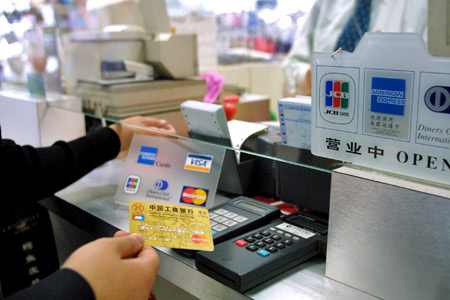Top Biz Photos
Pre-paid shopping cards grow more popular
By Wang Ying (China Daily)
Updated: 2009-12-07 07:54
|
|
|
A customer uses an Industrial and Commercial Bank of China credit card at a store in Beijing. Despite slow development of credit cards in China, many shops in major cities issue their own shopping cards as pre-paid cards that consumers inject with funds for convenient payment. The shops said they could make substantial profits from the cards. [Bloomberg News] |
A thin piece of plastic is reshaping China's consumer spending habits.
The pre-paid consumer smartcard industry, after being outlawed several times by China's financial regulators in the past, now has swept across the nation with billions of dollars in sales each year.
Visit an average store in Shanghai and you will find one or several card logos glued on cashiers' counters. They are shopping cards, which only look like credit cards, that consumers can use to buy anything in the store.
The local media estimated that almost every Shanghai resident holds at least one shopping card, which can be used in department stores, convenience stores, restaurants, gas stations and even hair salons.
The shops themselves issue some of the cards as pre-paid cards consumers inject with funds for convenient payment.
Others are issued by a third party that partners with the shops, with the card issuer earning commissions by selling cards.
The reason so many shops join the smartcard club is that they can make substantial profits.
For example, when clients buy these pre-paid debit cards, there typically will be a substantial amount of cash left over in the cards due to expiration or physical damage to the card.
In June, Shanghai-based National Business Daily reported that the shopping cards generate a huge profit chain.
|
||||
In addition, there is about 5 percent cash unused in the cards because of damage or expiration dates.
In other words, a card issuer can reap as much as 10 percent in net profits from selling these cards.
It's not just shoppers buying the cards. According to the head of a finance department at a State-owned company in Shanghai, the company each year will spend about 3 million yuan using these cards for different purposes: to acknowledge thanks to customers, to give out as gift cards and to hand to employees as benefits.
In China, sending gifts to friends and acquaintances is an old tradition.
"As people's living standard has greatly improved, it looks better to give a shopping card than a box of moon cakes during the Mid-Autumn Festival," said Sun Lijian, deputy dean of the School of Economics at Fudan University.
"Actually, shopping cards are not rare in Western countries. Some shopping malls and supermarkets, like Wal-Mart, issue shopping cards to strengthen customer loyalty. These cards can only be used in specific or issuer shops, but the card holder will also enjoy some kind of discount or extra benefit," Sun said.
However, the widespread use of shopping cards can create disadvantages, too, such as seeming like bribes, Sun said.
"Shopping cards have money in them, and someone gives it as a present to the department heads or leaders for a promotion or other favorable decision. As the cards are not real money, such a present seems far from a bribe," Sun said.
Shopping cards also can be a way of evading taxes. Some State-owned companies send cards to their employees as a kind of bonus. Such bonuses will not be included into traditional tax calculations.














